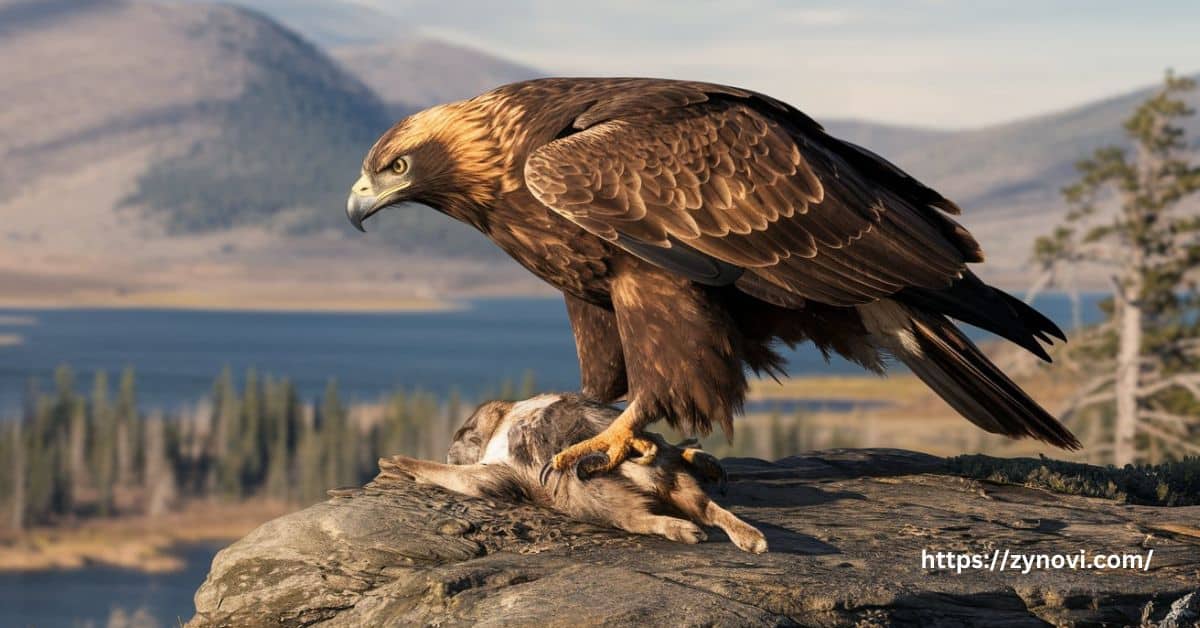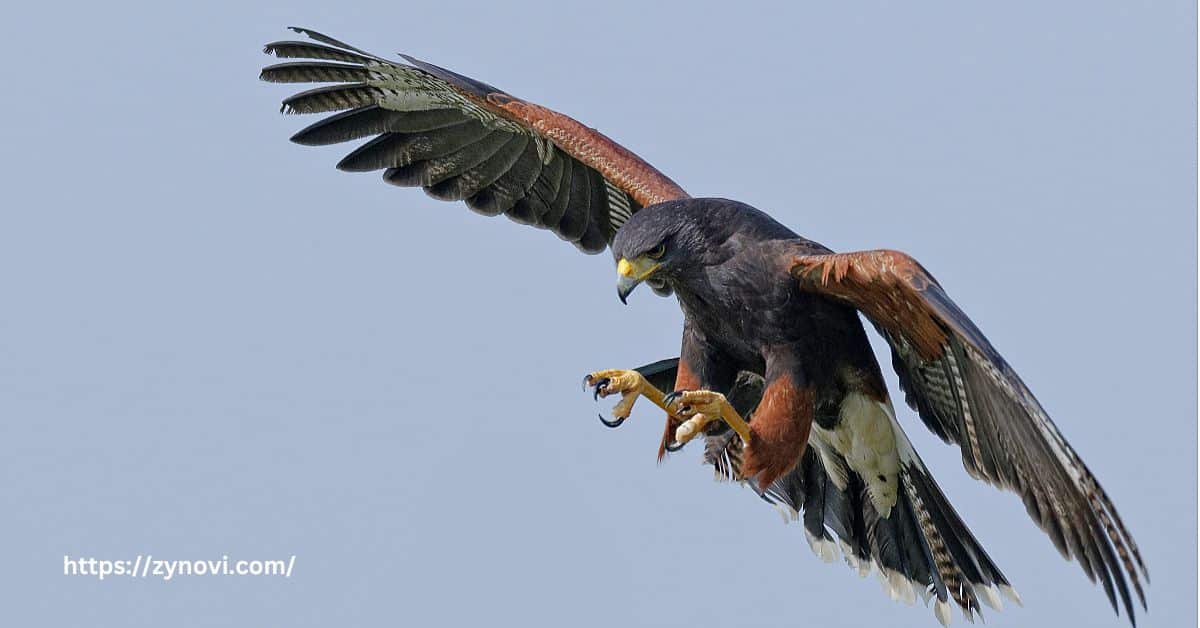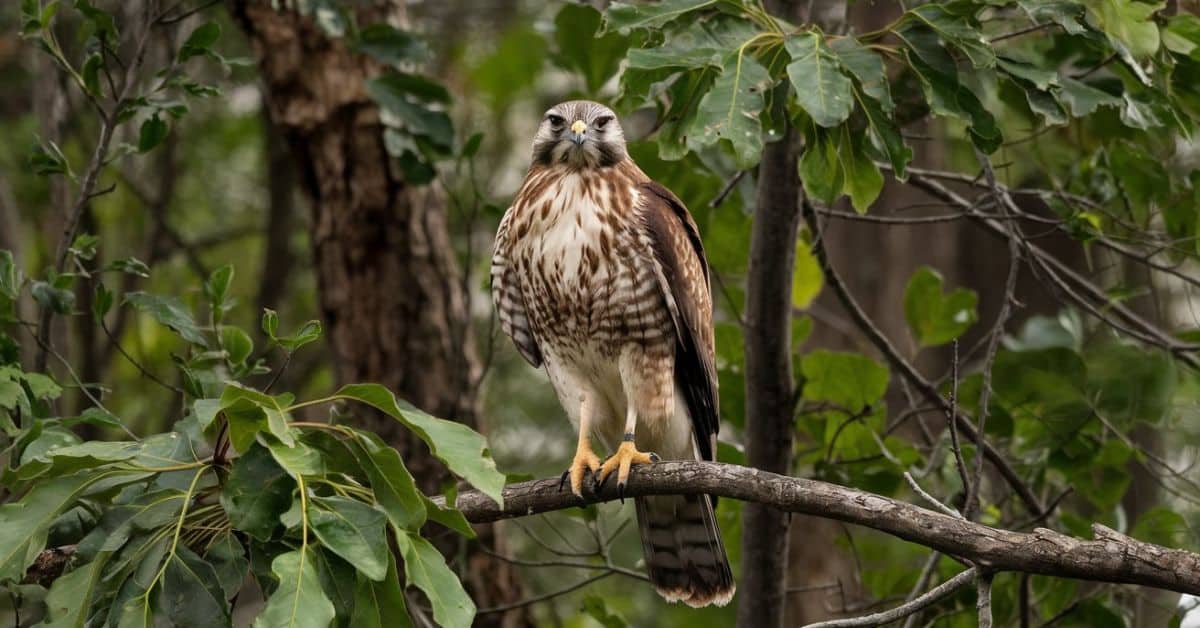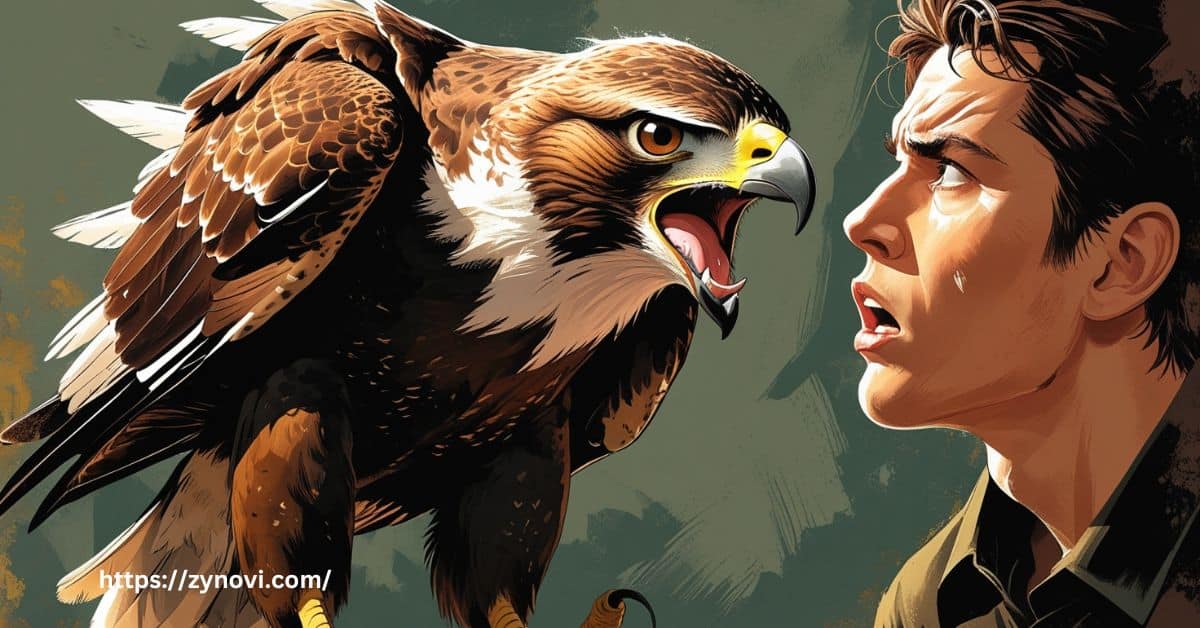Will Hawks Attack Humans? Hawks may attack humans if they feel threatened, during nesting season or if they mistake someone for prey.
It’s a question that crossed your mind while hiking through forests or suburban neighborhoods. These majestic birds of prey are often seen soaring high above, but could they ever pose a threat to you? In this article, we’ll find out the fascinating world of hawk behavior, when and why these powerful raptors might attack.
Whether you’re a nature lover, jogger, or someone who just wants to stay safe in hawk territory, understanding the risks is key. Keep reading to discover how to protect yourself and what to do if you ever find yourself in the path of an aggressive hawk.
Understanding Hawks
What Are Hawks?
Hawks are birds of prey belonging to the Accipitridae family, which includes other raptors like eagles and kites. Hawks are extraordinary birds of prey, known for their exceptional vision, sharp talons, and curved beaks.
While their beauty and prowess captivate bird watchers, their territorial behavior can lead to rare but memorable encounters with humans.
| Characteristic | Details |
|---|---|
| Global Distribution | Found worldwide, with common species like the Red-tailed Hawk, Cooper’s Hawk, and Sharp-shinned Hawk widely present in North America. |
| Size | Medium to large birds with wingspans ranging from 2 to 4 feet. |
| Habitats | Thrive in diverse environments such as forests, fields, cliffs, and urban areas, adapting to changing landscapes. |
Hawk Behavior and Hunting Techniques
Hawks are primarily diurnal hunters, meaning they are active during daylight hours. These birds of prey exhibit remarkable hunting prowess, combining silent flight, exceptional vision, and calculated precision to capture their prey.
They predominantly hunt small mammals, reptiles, and birds, swooping down with speed and accuracy. Beyond sustaining their diet, hawks play a crucial ecological role by controlling small animal populations, which helps maintain balance within the ecosystems they inhabit.
Will Hawks Attack Humans?

How Common Are Hawk Attacks on Humans?
Hawk attacks on humans are rare but not unheard of. Most encounters occur during nesting season, typically from spring to early summer, when hawks exhibit aggression to protect their young.
Hawks may also mistake shiny objects, umbrellas, or reflective surfaces for threats. Reports of hawks swooping down on joggers or hikers stem from their territorial instincts rather than predation.
Why Would a Hawk Attack a Human?
Hawks rarely attack humans unless they feel threatened or provoked. However, several scenarios can trigger such behavior:
- Proximity to Nests During Breeding Season
Hawks become especially protective during the nesting season, often attacking anything they perceive as a threat to their eggs or young. - Perceived Danger to Their Young or Territory
If a hawk senses its territory or offspring is in danger, it may exhibit defensive aggression to ward off intruders. - Human Activities Near Nesting Sites
Jogging, construction work, hiking, or even walking near a nesting area can unintentionally provoke hawks, causing them to swoop defensively. - Mistaken Identity as Prey
Small pets, shiny objects, or certain movements may resemble prey, leading to accidental attacks when hawks act on instinct.
Instances of Hawk Attacks
While hawk attacks on humans are uncommon, several documented incidents highlight the situations where such encounters have occurred:
- Hawks Swooping in Suburban Areas
In neighborhoods, hawks have been known to swoop at people walking dogs or carrying shiny objects, mistaking them as threats or prey. - Joggers and Cyclists Near Nesting Sites
Individuals exercising near tall trees during the nesting season are sometimes targeted by hawks protecting their territory. - Wildlife Photographers and Bird Watchers
Enthusiasts getting too close to hawk nests for photos or observations may unintentionally provoke aggressive defensive behavior.
Are Hawk Attacks a Serious Threat?
Hawk attacks can cause minor injuries like scratches from their sharp talons or bruises from their impact. However, they are seldom life-threatening. The most significant risks include:
- Talon Injuries and Infection
Scratches caused by hawks’ sharp talons can become infected if left untreated, requiring medical attention to prevent complications. - Eye Injuries from Direct Attacks
If a hawk targets the head or face, its talons could cause serious damage to the eyes, posing a significant health concern. - Psychological Effects on Victims
Being unexpectedly attacked can leave individuals feeling startled, anxious, or fearful of encountering hawks in the future.
How to Safe From Hawk Attacks

Preventing hawk encounters is key to ensuring personal safety. Here are effective strategies:
- Avoid Nesting Areas
During nesting season, steer clear of tall trees, cliffs, and urban sites like rooftops where hawks are known to nest, as these areas trigger territorial behavior. - Be Aware of Your Surroundings
Watch for hawks circling overhead or making loud, aggressive calls—signs that you may be too close to their nest or young. - Carry Protective Gear
Use umbrellas or wear wide-brimmed hats in hawk-prone areas to protect yourself and deter swooping attacks. - Move Calmly and Steadily
Refrain from running, yelling, or waving your arms, as sudden movements can escalate the hawk’s defensive behavior. - Cover Reflective Items
Reduce the risk of hawk attraction by concealing shiny or reflective objects like jewelry, bike helmets, or tools that may be mistaken for prey.
What to Do If a Hawk Attacks You
Though rare, hawk attacks can be unsettling. If it happens, here’s how to respond:
- Protect Your Head and Face
Shield your head and face using your arms, a bag, or an umbrella to guard against the hawk’s sharp talons and beak. - Move Out of the Area
Back away slowly, maintaining calm. Sudden movements might provoke the hawk further, so try to stay composed. - Seek Medical Attention if Injured
If scratched or injured, clean the wounds thoroughly to prevent infection. If the injury is significant, seek medical attention and consider getting a tetanus shot. - Report Aggressive Behavior
Contact local wildlife authorities to report the attack. This is especially important if the hawk is displaying repeated aggressive behavior in a public or frequently visited area.
Hawk Behavior During Nesting Season
During the spring to early summer, hawks are particularly territorial and protective of their nests. Here are common behaviors to watch out for:
- Swooping at Perceived Threats
Hawks may dive or swoop at anyone who comes too close to their nests, seeing them as a potential threat to their eggs or young. - Loud, Repetitive Calls
These calls serve as warnings to other birds and animals, signaling that the hawk is defending its territory and will take action if needed. - Circling Behavior
If a hawk starts circling overhead, it’s typically an indicator that they are trying to intimidate or warn intruders to leave their nesting area.
Hawk Nesting Habitats
Hawks are adaptable creatures, building their nests in various environments, from natural locations to urban spaces:
- Tall Trees and High Cliffs
Traditionally, hawks choose tall trees and cliffs for their nests, offering both shelter and a high vantage point to spot potential threats. - Urban Areas
Increasingly, hawks have been observed nesting in urban areas, particularly on buildings, telephone poles, and other high structures. This adaptation to human habitats underscores the need for awareness for those living near these areas.
all trees, high cliffs, and increasingly, in urban areas like telephone poles or building ledges. Their adaptability to human environments makes awareness critical for those living near hawk nesting sites.
Hawk Ecology and Role in the Environment

Hawks are vital to ecosystems, maintaining balance by controlling populations of small mammals, birds, and insects. Their predatory behavior helps:
Prevent overpopulation of certain species:
Hawks help control populations of small mammals and birds, preventing the overpopulation of species like rodents that could otherwise damage vegetation and crops.
Protect crops by reducing rodent activity:
By hunting rodents, hawks play a crucial role in protecting crops, as these pests often cause significant damage to agriculture by consuming crops and spreading diseases.
Promote biodiversity through balanced prey-predator relationships:
Hawks contribute to maintaining biodiversity by keeping prey populations in check, ensuring that no single species dominates and allowing for a healthier, more diverse ecosystem.
Legal and Safety Considerations
Hawks are protected by law, and it’s important to understand the legal and safety implications:
- Protected by the Migratory Bird Treaty Act
Under the Migratory Bird Treaty Act, hawks are protected, making it illegal to harm, capture, or disturb them. Violating this law can result in heavy fines or other legal consequences.
Safety Tips
To ensure your safety and the well-being of hawks, follow these essential tips:
- Never Attempt to Harm or Relocate a Hawk Nest
It is illegal to destroy or disturb a hawk’s nest. If a nest is in a problematic location, it’s important to leave the situation to wildlife authorities to handle appropriately. - Consult Wildlife Experts if Hawks Become a Safety Concern
If hawks are causing safety concerns in your area, contact local wildlife experts or authorities. They can help assess the situation and advise on the safest course of action.
Final Thoughts
While hawks may exhibit aggressive behavior during nesting season or when they feel threatened, actual attacks on humans are rare and usually non-lethal. By understanding hawk behavior, respecting their habitats, and following preventative measures, you can coexist peacefully with these magnificent birds.
Their role as apex predators is critical to maintaining the balance of our ecosystems. Remember, hawks aren’t inherently dangerous they’re just protective parents doing their job. So, stay aware, stay respectful, and enjoy observing these raptors from a safe distance.
FAQs
Will hawks attack a person?
Hawks rarely attack humans, but they may swoop down if they feel threatened or are protecting their nests.
Has anyone been attacked by a hawk?
Yes, there have been a few documented cases of hawks attacking people, typically near their nesting sites during breeding season.
What happens when a hawk visits you?
If a hawk visits you, it’s likely observing its surroundings, but be cautious, especially if it’s circling or swooping this could indicate aggression.
What are hawks most afraid of?
Hawks are most afraid of larger predators, loud noises, or threats to their territory, like other birds or animals approaching their nests.
Conclusion: Will Hawks Attack Humans?
While hawk attacks on humans are rare, they can occur, especially during the nesting season when hawks are most protective of their territory. These birds are generally not aggressive toward humans unless provoked or if they perceive a threat to their young.
Understanding hawk behavior, staying clear of nesting areas, and taking precautions like wearing protective gear can significantly reduce the risk of an encounter. By respecting their space and remaining calm, you can safely coexist with these fascinating birds without fear of attack.










